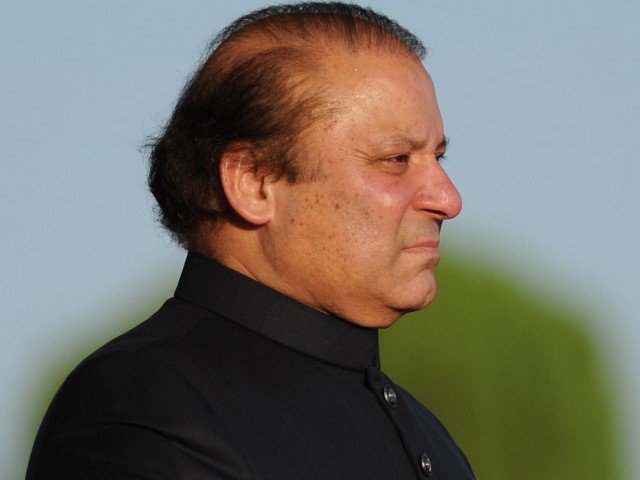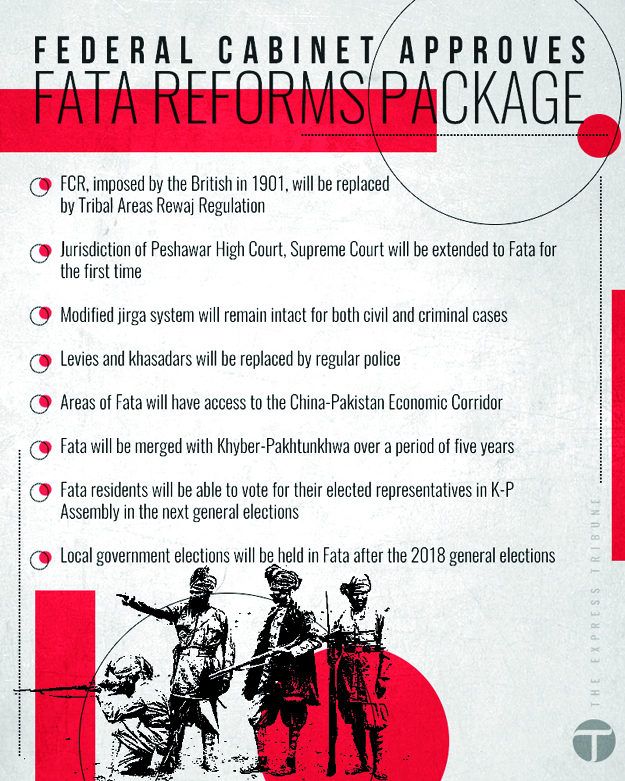
In a watershed development, the federal cabinet on Thursday approved the recommendations of the Fata reforms committee which, besides other things, envisages merger of Fata with adjoining Khyber-Pakhtunkhwa over the next five years.
The cabinet also decided to repeal the Frontier Crimes Regulation (FCR), the most controversial set of laws introduced by the colonial power in 1901, and replace it with the Rewaj Regulation for Tribal Areas through an act of parliament. It also decided to bring Fata ‘at a par’ with the other areas of the country through a 10-year development package.
Prime Minister Nawaz Sharif presided over the cabinet meeting where attendees included federal and state ministers, as well as all members of the Committee on Fata Reforms, along with its convener, Sartaj Aziz.
Aziz — flanked by the committee members as well as K-P Governor Iqbal Zafar Jhagra — later shared details at a news conference in the Foreign Office. “It is a historic decision and we must congratulate the whole country as the decades-old demand of the tribespeople has been fulfilled,” he said.

He said the cabinet approved in principle recommendations of the reforms committee to mainstream Fata in the next five years in consultation with all stakeholders. “A provision will be made through a constitutional amendment enabling the people of Fata to elect their own representatives to the K-P Assembly in 2018,” he said.
To a question as to when the government would introduce the reforms bill, Aziz said it would soon be taken up by parliament, though he wouldn’t give a tentative date.
Aziz said the FCR would be repealed and replaced with the new Rewaj Regulation for Tribal Areas which would be submitted to the president of Pakistan for approval under Article 247 of the Constitution.
“Provisions relating to the collective responsibility clause will be omitted; thereby making an individual responsible for his own acts,” he said. Under this clause, the whole tribe has to face punishment for the misdeeds of any of its members.
Aziz hopeful that the Temporarily Displaced Persons (TDPs) would be repatriated and resettled in their hometowns by May this year, adding that most activities under the reconstruction phase should be completed before the end of 2018.
Aziz said a special committee, comprising high-level experts and officials and headed by the K-P governor, would be formed by April 30, 2017 to prioritise preparation of a 10-year socio-economic development plan for Fata.
According to the reforms package, the National Finance Commission (NFC) would be requested to consider making an allocation of 3% of the federal divisible pool on an annual basis for the Implementation of Fata Development Plan (FDP).
This will be in addition to the existing annual Public Sector Development Programme (PSDP) allocation of Rs.21 billion. Interestingly, the K-P and Sindh have already opposed giving 3% of the divisible pool to Fata in a recent meeting of the Council of Common Interests (CCI).
Similarly, about 30% of the allocation in the FDP would be channeled through the local governments (LGs) while the Fata Development Authority (FDA) will be reorganised for implementation of the 10-year Socio-Economic Development Plan for Fata.
The approving powers of the Fata Development Committee (FDC) will be enhanced through due process from the present Rs400 million to Rs2 billion and that of Fata Development Working Party from Rs200 million to Rs1 billion.

Party-based LG elections would be held in Fata soon after 2018 general elections. Permit system for exports from and imports into Fata would be abolished to eliminate large scale corruption. Auditor General of Pakistan would ensure that development funds and all other LG expenditure in Fata are properly audited.
Jurisdiction of the Supreme Court of Pakistan and the Peshawar High Court would be extended to Fata through an act of parliament so that the inhabitants of Fata enjoy equal rights. Apart from reconstruction of destroyed or damaged check posts, the government will also create additional posts of Levies.
The Frontier Corps (FC) would also undergo a capacity building exercise and new FC wings would be created for improved border management. All posts in Fata would be upgraded and brought at par with the K-P.
Salaries for the project personnel in Fata would be 20% higher than that admissible under the project policy of the K-P. Connectivity of Fata with China-Pakistan Economic Corridor (CPEC) would be ensured at suitable locations. The State Bank of Pakistan would also encourage establishment of more branches of banks in Fata.
The President Order of 1972 regarding deputation of civil servants in Fata would be suitably revised to empower the K-P governor to attract competent officers from multiple sources for the transition period.
Land settlement would be planned and undertaken in consultation with the stakeholders by using modern technology to create GIS based computerised individual record of rights. Proper coverage of Benazir Income Support Programme, Baitul Maal and microfinance schemes would also be ensured.
Quota of Fata students in education and health institutions of other provinces would be doubled and retained for 10 years after its integration with the K-P. A Directorate of Transition and Reforms for coordinating and monitoring the reforms would also be set up.
Empowering FATA a collective responsibility: PM
A press release issued after the meeting by the PM office said the prime minister stressed the need to focus on underdeveloped areas with the aim to improve the living standards of the people living there. “The time has come that the tribal people will be brought into mainstream to end their sense of deprivation,” Nawaz was quoted as saying.
Nawaz said it was a collective responsibility of federal government and provinces to come forward for development and mainstreaming of Fata, Azad Jammu and Kashmir (AJK) and Gilgit Baltistan (GB).
“This date is a landmark in the history of this country. Since the dawn of our nation, select people have been treated differently due to their place of birth,” he added.
Nawaz said the people of Fata had been deprived of their fundamental rights for too long and facing economic deprivation, pains of terrorism, and the anguish of isolation.
However, the PML-N government had finalised reforms that would bring Fata out of the primitive ages.
He said the roadmap for merger of Fata with the K-P would provide them constitutional protections, local governments, a criminal justice system, modern policing and a share in the fruits of development.
“The people of Fata will no longer be at the whims of an unjust and unaccountable system. Today, they are on the true path of freedom and can share the dream of prosperity and be a part of a country on the road to becoming stable, secure and safe for people of all stripes,” the PM said.
Nawaz Sharif said development of Fata was the responsibility of the entire nation and country. “Mainstreaming and developing these less developed areas is not the sole responsibility of people living in Islamabad, but every Pakistani must contribute in this process,” he said. [WITH ADDITIONAL INPUT FROM APP]
Published in The Express Tribune, March 3rd, 2017.

1732530816-0/BeFunky-collage-(88)1732530816-0-165x106.webp)
1720848500-0/Eminem-and-his-daugher-Hallie-(1)1720848500-0-165x106.webp)








COMMENTS (1)
Comments are moderated and generally will be posted if they are on-topic and not abusive.
For more information, please see our Comments FAQ